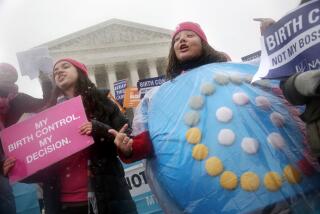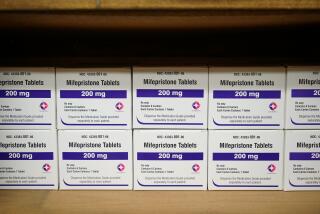Acne-Drug Registry Aims to Cut Birth Defects
WASHINGTON â Every patient given the acne drug Accutane must be enrolled in a national registry as part of major new steps to prevent pregnancy among women using the birth defect-causing medicine, government advisors said Friday.
The registry system would mandate that women cannot get their monthly supply of Accutane without a negative pregnancy test, and that they be told to use two forms of contraception while taking the drug.
Every health worker who prescribes Accutane and each drugstore that dispenses it must be registered too -- and the drugstores must double-check that women are properly cleared before handing over the pills, said scientific advisors to the Food and Drug Administration.
If a woman becomes pregnant while taking Accutane or generic isotretinoin, her baby could suffer severe brain and heart defects, mental retardation and other abnormalities, even if the mother took only a small dose for a short period. Thereâs a risk for 30 days after stopping the drug too.
In 2001, the FDA began urging pregnancy testing and contraceptive education before doctors prescribed Accutane, but itâs a voluntary system that the agency acknowledges has failed to reduce pregnancies.
On a 16-8 vote, the panel decided that a strict registry system offered the best attempt at protecting fetuses. The FDA isnât bound by its advisorsâ recommendations but typically follows them and pledged a quick decision.
âDoing nothing and making no change is really not acceptable,â the FDAâs Dr. Sandra Kweder said.
Accutane manufacturer Hoffman-La Roche Inc. and makers of the generic isotretinoin support a registry.
Under the plan, users of all forms of isotretinoin would be listed under a single nationwide registry. Men would be listed too because itâs important that they understand not to share an Accutane prescription with women.
Even with the new curbs, pregnancies wonât be eliminated, the FDAâs advisors cautioned.
âThereâs a certain limit to what we can do,â said Dr. Robert Katz, a Rockville, Md., dermatologist who told of a patient who insisted with each monthly Accutane prescription that she wasnât sexually active -- until the day she called him in a panic that sheâd missed a menstrual period.
âYou canât completely control human behavior,â he said.
Part of the problem is that Accutane is prescribed too often, said FDA advisor Dr. Eileen Ringel, a Waterville, Maine, dermatologist. It is intended for people with very severe acne, the kind that causes large cysts and leaves deep scars, yet âfemales are being treated for less severe acne with Accutane,â she said.
The advisors urged quick implementation of the registry, citing mothers who pleaded with the panel for better protections.
âWarning is simply not enough,â said Debbie Banner of Virginia Beach, Va., who said another side effect of Accutane -- depression -- can lead women to disregard or not understand the need for contraception. She blames a drug-caused bout of severe depression on unprotected sex while using Accutane.
âI was devastated that I played a role in my own son being deformed,â said Banner, whose 7-year-old has serious brain damage.
Accutane has posed a birth-defect problem since it first hit the market in 1982.
The FDA has more than 2,000 reports of women on isotretinoin becoming pregnant since then. The vast majority opted for abortion. While some healthy babies were born, the FDA counts more than 160 born with Accutane-caused birth defects in that time -- although critics note that there could be many more left uncounted because doctors arenât required to report Accutane-linked pregnancies to the agency.
Repeated warnings to doctors and patients didnât help, so in 2001, the FDAâs advisors recommended a registry.
Citing legal concerns about privacy, the FDA settled on voluntary restrictions instead. But in the first year of the voluntary curbs, FDA counted 120 pregnancies among Accutane users, just seven fewer than in the previous year -- even though overall prescriptions dropped by 23%.






